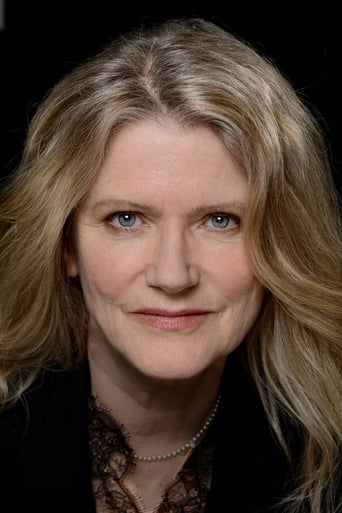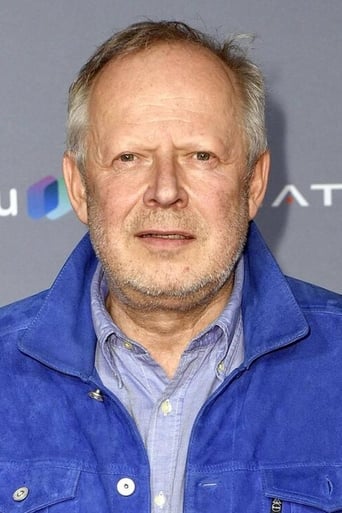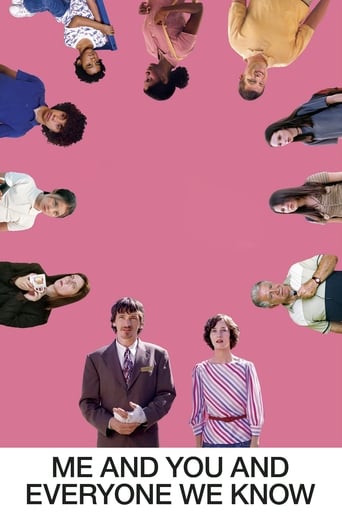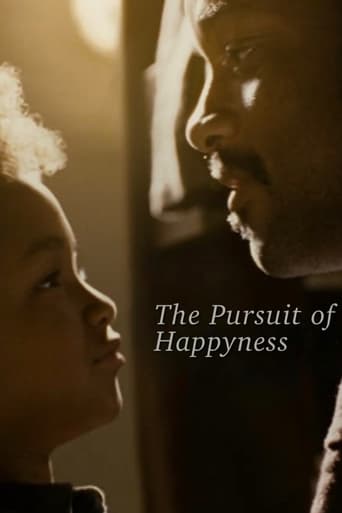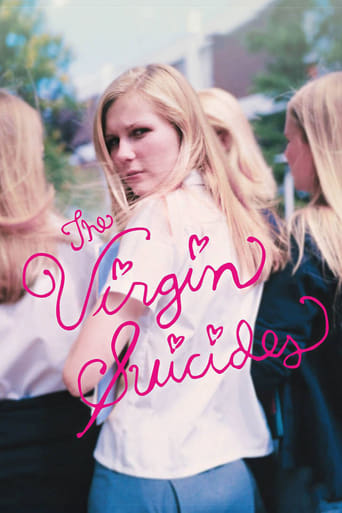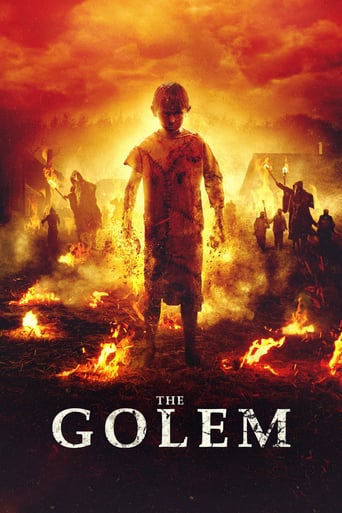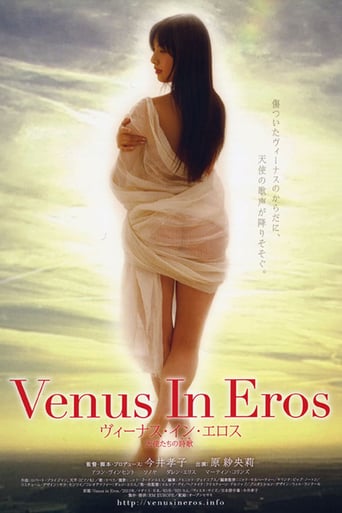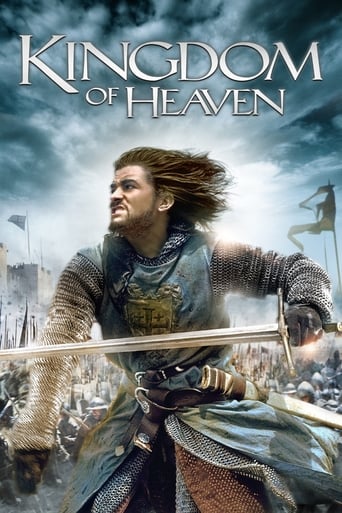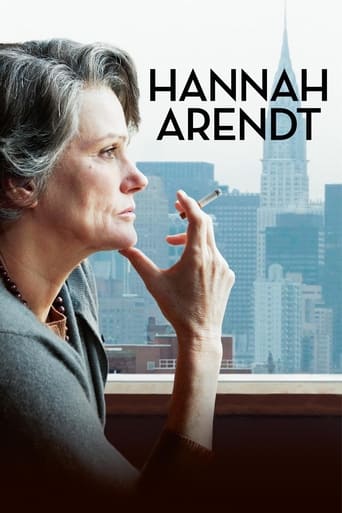

Hannah Arendt (2013)
HANNAH ARENDT is a portrait of the genius that shook the world with her discovery of “the banality of evil.” After she attends the Nazi Adolf Eichmann’s trial in Jerusalem, Arendt dares to write about the Holocaust in terms no one has ever heard before. Her work instantly provokes a furious scandal, and Arendt stands strong as she is attacked by friends and foes alike. But as the German-Jewish émigré also struggles to suppress her own painful associations with the past, the film exposes her beguiling blend of arrogance and vulnerability — revealing a soul defined and derailed by exile.
Watch Trailer
Cast


Similar titles
Reviews
Touches You
The Worst Film Ever
Although it has its amusing moments, in eneral the plot does not convince.
It is an exhilarating, distressing, funny and profound film, with one of the more memorable film scores in years,
There are momentous events that shape our world, with individuals, Hitler, Napoleon, Marx -- who take the stuff of their birth world and shape it into something different. Those who capture forces and marshal them for revolutions, are both hated and loved, saviors and monsters -- and the winners write the history.True Philosophers transcend this. They remove themselves from those who hate and admire such transforming figures, and by doing so risk becoming alienated from their own group. Thus is the case of Hannah Arendt in the period of this film. As a student she had a love affair with Heidegger, one of the great philosophers of the early 20th century - who as a human being joined the Nazis.Arendt, being a Jew, in a covering the trial of Adolf Eichman, became the thinker, the philosopher, while those survivors of the Holocaust were in pain over their loss, and in no mood to intellectualize the perpetrators.Although I lived only miles from Arendt at the time of this film, I was far removed from the academic culture described, and now more than a half century later, look back with a top of nostalgia and remorse. I knew some who survived the death camps, and certainly could identify with those who reviled Arendt for not loathing Eichman.Yet these are the challenges of today. We have child terrorists such as one who just killed nine people in a black church our of the same inculcated hatred as the Nazis towards Jews. Arendt's thinking is valuable, and needed since the disease of hatred of outsiders does not seem to be fading, but rather is a constant recurrence of humanity.
I've tried reading Arendt's essay "Eichmann in Jerusalem" several times but I've always gave up for many different reasons (her extremely long paragraphs are awfully distractive, it's very easy to lose focus with her conflicted issues and almost no agreement). And with this film, I may try to read it again. Not because it was a spectacular movie, but mainly because it offered a more detailed perspective on someone who wrote one of the most important and historical literary works, and someone who at the end of the journey lost many friends to defend her ideals and concepts, formed with was presented to her during the judgment of a Nazi executor. The movie "Hannah Arendt" brings up the controversial highlight of her career with the publishing of a report of the trial of Adolf Eichmann in Haifa, in 1961 - the report came two years later. Here, it's explored her observations about one of the most criminal minds of WWII, a bureaucrat who sent millions of Jews to death camps, and an examination of the heated reactions coming from the public who strongly disagreed with Arendt's report on several levels. She concluded that he wasn't the monster he was painted to be, and wasn't even anti-semitic; instead the man was a civil officer who couldn't disobey orders because doing that would be perceived as negative, thus creating what she defined as the banality of evil, meaning that evil takes place when ordinary people are put into situations that encourage their conformity. Another shocking revelation (and bear in mind that she was Jewish herself) was the alarming fact that some Jewish community leaders were very cooperative with the Nazis, or considered helpful to the final solution.Margaret von Trotha's film captures the battle, a glimpse of the essence of such report and how the conception of the banality of evil was conceived. Arendt exposes the real Eichmann as a simple career employee, working for the state and just following orders; disobey them would cause severe punishment. So, it was easier of him to sign papers and send thousands to die in concentration camps than to say 'no' to deplorable and inhumane orders. With those views, she got plenty of negative feedback coming from allies, enemies, and people who felt betrayed by her report. The controversies goes to this date. Those questionings, dualities and doubtful issues are thought-provoking and what makes the movie really interesting, a fine observation of events highlighted with a phenomenal performance by Barbara Sukowa, who also gave a outstanding performance in another biopic directed by the same director, "Rosa Luxemburgo" (1986), and the always dedicate Janet McTeer in a good supporting role. That's the kind of story that should have been made years ago. It's not that it lost some importance but it has became too distant. However, it's far from going without criticism. It's deeply flawed and no, it has nothing to do with its historical accuracies - though it may have it's fair share of dramatic licenses. I felt the film very reserved, lacking of a more cinematic expression, at times some of the acting was very amateurish; the inclusion of flashbacks of love interlude with one of Hannah's teachers weren't defining to the plot; and it was hugely annoying having two languages spoken from time to time - this mixture of studio/producers hurt the project, I think. An American production would be fantastic (if only they were interested in it...). History as a fictionalized version always attracts viewers and the movie as a simplified story didn't disappoint. I liked it, just wish it could have been more. 7/10
Margarethe von Trotta's movie certainly has some 'acting issues'. Many of the performances are stiff and wooden and just lacking in enthusiasm. But Barbara Sukowa shines so brightly as Hannah that she lifts all others to an acceptable level.I consider it a privilege to have seen this movie because the story of this event, not just in Arendt's life, but in western history needs to be told. Arendt's philosophical interpretation of the Eichmann trial carries a lot of weight in the 'understanding' of the human condition. As horrible a person as Eichmann was, he was still human, and thanks to Arendt we can see where unquestioning obedience to authority will always produce a nightmare result.It's the story that will keep an interested person viewing this wonderful movie even with it's glaring weak points. It's all worth it to see and hear the impassioned speech Arendt gives near the end of the movie.
This film helped me to forget that it was a film. Subtle, intelligent but mostly telling a story imperative to the 21st century. By making links throughout Arendt's personal life and development as not only one of 20th century's most brilliant thinkers and philosophers but a sentient passionate and moral woman, juxtaposed with her work—and the aftermath of—her New Yorker articles on the war crimes trial of Adolf Eichmann, Arendt, without making such a projection, articulates what this current era of humanity suffers from most: "The banality of evil". The film brings this point into sharp focus without as much saying this is what we need, but the timeliness of it is most certainly intentional.This film also beautifully, and again subtly, captures the state-of-mind of an era: One of calcified righteousness among others who cherished clarity of mind, goodness and intelligence, and a style of humor and affection from which those things flowed freely.See the film to understand exactly what all this means and why Arendt's topic of the "banality of evil" is so important for today's crises facing humanity.


